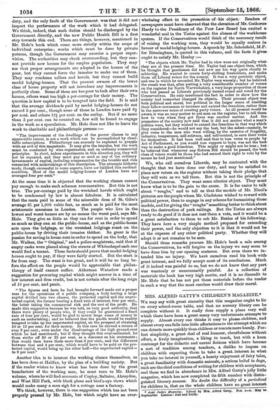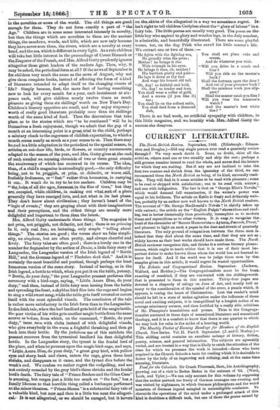MRS. AT.,F,RE,D GATTY'S CHILDREN'S MAGAZINE.* WE may say with great
sincerity that this magazine ought to lie on every school-room table, and that no nursery library can be complete without it. It really does supply a place very well which there have been a great many very unfortunate attempts to- supply. Almost every one thinks it easy to please children, and almost every one falls into little affectations in the attempt which no one detects more quickly than children or resents more keenly. Per- fect simplicity, a great deal of real humour, cheerfulness without effort, a lively imagination, a liking to teach, but with a keen contempt for the didactic and unreal fictions which have become a sort of tradition among teachers, a dislike to impose on. children with expecting them to take a great,interest in .what. you take no interest in yourself, a hearty enjoyment of fairy tales,. a great familiarity with domestic animals, a serious belief in dogs,, such are the chief conditions of writing for children with acceptance, and these we find in abundance in Mrs. Alfred Gatty's jolly little magazine, which has now completed its.fifth number with distin- guished literary success. No doubt the difficulty of a periodical for_children is, that on the whole children have no great interest.
• Aunt .Tudgs Magazine. Edited by Km Alfred Getty. Nos. 1-5. May to Septembea. leaden: Bell and Dald3c. in the novelties or news of ,the,world. The old things ,are good enough, for them. They do not form exactly a part of " the Age." Children are in some sense interested intensely in novelty, but then the things which are novelties to them are the ancient things, the meadows, woods, and hills, which are new only because theyhavenever seen them, the rivers, which are a novelty at every bend, and the :sea, which is different in every light. As a rule children will take but little interest in the proceedings of Count Bisnaark or the Zniperor of the French, and l‘lre. Alfred Gattyprudentlyignores altogether thoae great, -leaders of the modern Age. Then, why, it may be asked, the periodical form at alt? If the news of September is for- children very much the same as, the news of August, why not give them complete books, instead of affecting the form of a kind of literature intended to adapt itself to the changing events of 'life-? Simply because, first, the mere fact of having something new to look for every month for a year, each instalment at six- pence each, will give children nearly twelve times as much pleasure as giving them six shill; z,s' worth on New Year's Day. Children's literary appetites are small, and they enjoy sixpenny- worth of ,really goal, literature probably more than six shillings worth of the nan4 kind of food.. 'Then the discussiqns that, take place,,as to the stories which are "to be continued." will be in themselves a fresh enjoyinen.t, though we admit that the gap of a month at an interesting point is a great trial to the child, perhaps a salutary check to the eagerness of childish expectation, to Which a menth seems nearly as much as a year seems to us. Then there may be,and is a little adaptation.in the periodical, to the spacial semen, in. articles, on out-door life, birds,-: or- flowers, or country amusements', adapted thaseason,of the yearrand.Mrs.. Getty gives at,theeed, of emit nutn,ber an, apaufsing chronicle of two or three great. events the anniversary of which has occurred in -its course. The idea, then, of a child' magazitke isexce,edinglygood,—the only difficulty being„, not, to be „priggish, or prim, or,, didactic„ or worse still,• foolishly,froliesoine, or " fast r rather-than-humorous, in,carrying it It avonA do to ,try to be toe. modern. Childre,n may be " tlita.heirkel,all the ages,Joreinost in, the files of time,." but they are;oceupied, while :children, in making out whaiosert.of a place, generally they have emerged hitt-4, and0t, what h is :its last phase. They don't: know about civilization; they haven't heard of the "logic of events ;" they are groping about with their imaginations and. ,their perceptions,, and, the oldest things are--usually more delightful and important to theta than the.latest-, Mrs. Alfred Gatty understands -these things. The magaza.ne is not prim, not priggish; not didactic,, not fast ; therais no grinning in it, only real, fun; no leatnring, only simple "telling about things." The, stories- are. good"; the verses show no false slippli- city, no simple-0e, but, are often pretty, ...and always cheerful ,and lively. The fairy tales are often good ; there is a lovely one in the number for September by the_auther of Denise, a little fairy story of Languedoc, the Languedoc version of the Irish legend of "Bottle 1-Till).7 and, the..GeP1)411Pigtad..Pf. Tischchen deck dick." Awlit is certainly the most beautiful and poetical, though perhaps the least humorous version. of the samestory. Instead of having, as in the Irish legend, a bottleto which, when you put it on the table, youeay, "Bottle, do your duty," the poor.Lanuedoc peasant performs this ceremony with a bird-cage, saying„ "Little Azure Blue, do your duty," and then,. instead of little fairy men issuing from the bottle and spreading the feast, kskyblue bird flies into the cage and begins to sing a wild,sweet song, while the table gets itself covered or covers itself with the most splendid. viands. The conclusion of the tale is rather more satisfactory in the Irish form than in the Languedoc. In the kishtalerwhen the bad landlord gets hold of the magicbottle, the poor victim of hiswiles gets another magic bottle from the same source as before, from which, on the command, "Bottle, do your duty," issue, men with dui* instead of with delightful viands, who give everybody in the room a frightful thrashing and. then go back into their bottle. By the judicious use of this antidote the, peasant recovers from the tyrannical landlord his first delightful bottle. In the Languedoc story, the tyrant is the feudal lord of the place, and when he pounces upon the magic bird-cage, and says, LitA1,4inurq,J3lue, do youe duty," a great grey bird, with yellow eyes and sharp beak and claws, enters the cage, gives three loud Shiieka, and. disappears as it came, and the tyrant dies before the week's,end.. We confess we rather regret the cudgelling, and are not entirely consoled by the grey bird's three shrieks and the feudal lord's death. The fairy tale of " Prince Boohoo and the Glass Case!' is ionnsing, but verges just a little too much on "the fast," hasjs family likeness to that horrible _thing called a burlesque performed at the .minor theatres.. " PrinceSleona "is a substantial fairy tale of a valuable kind, but now And then is a little too near the allegori- cal., It' is not allegorical, or we should be enraged, but it hovers on theskirta of the allegorical in a way we sometimes regret. DP, isn24 right to tell children Carlylese about the "glory of labour" in a. fairy tale. The little poems are usually very good. The poem on the little boy who aspired to glory and wooden legs, in the July number,. is admirable, and beautifully illustrated. There are some playful verses, too, on the dog Frisk who saved his little master's life. We extract one or two of them :— "He fights with the fighting sea, He grandly wins the prize ; Mother! he brings it thee
With triumph in his eyes. He brings it thee, oh, mother I His burthen pretty and pale— He lays it down at thy feet And wags his honest old tail.
"Oh, dog! so faithful and bold, Oh, dog ! so tender and true, You shall wear a collar of gold, And a crown (if you like it) too ; You shall lie on the softest satin, You shall feed from a diamond dish, You shall eat plum cake and cream, And do whatever you wish.
"Will you drive in a coach and . four ?
Will you ride on the master's- hack?
Shall the footman open the door ? And out of your presence back ?* Shall the mistress work you slip- pers ?
Shall the master catch you flies? Will you wear the mistress's watch ?
And the master's boat white ties ? "
There .is no bad, work, no artificial sympathy .with children, in this little magaeine, and we .heartily wish Mes,Alfzedl,Gatty the success she deserves.































 Previous page
Previous page